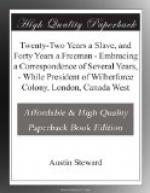Uneducated as was Lewis, his quick perception, his ungoverned passions, and his native independence, not only made him a dangerous slave, but an unfaithful and overbearing companion. He, however, took a wife—a slave like himself,—whose devotedness and good sense, cannot be made manifest, more than in her willingness to leave all that was dear to her on earth, and flee from their birth-place, she knew not whither; but confiding in the professed love and protection of her husband, she cheerfully followed him to the dense forest, in search of that freedom, denied them in their native country,—submitting herself gladly to all the hardships and fearful anxieties of a fugitive slave. What to her were horsemen, armed with dirk and rifle! What though the trained and inhuman blood-hound bayed upon their track! Was not he who had sworn a life-long allegiance to her by her side! Should he be killed or retaken, what could she desire, but to be his companion still! Slavery even, bitter as was the cup, might contain for her one sweet drop, while connubial love lighted up their rude cabin, and sweetened their daily toil; but the additional anticipation of LIBERTY, to their domestic happiness—oh blessed hope! How it quickened their weary footsteps, and, with fixed eyes upon the star of the North, they pressed forward through every difficulty, until they finally reached Cincinnati, O. There they lived quietly, and with others, suffered the terrors of the mob, where also he was chosen agent, to seek a more safe and quiet home for his afflicted and outcast countrymen. The office was accepted, and Lewis became the founder of the Wilberforce colony.
The personal appearance of Israel Lewis was prepossessing; his manner and address easy and commanding. To those unacquainted with his private life, his ungoverned passions, and his unprincipled, revengeful disposition, he could appear the gentleman, the philanthropist, and the Christian.
His education was limited; yet he had managed to gather a sufficient knowledge of the sciences to enable him to read and write, together with quite a fund of general information; and then his shrewdness and tact accomplished all the rest. To strangers he could appear a ripe scholar, if left unquestioned. He was a good speaker, and once spake with eloquence and marked effect before the Legislature, assembled in the Senate Chamber, at Albany, N.Y.
Had the childhood of Mr. Lewis been passed under more favorable auspices; had his intellectual faculties been so cultivated as to predominate over his animal propensities, and his towering aspirations directed toward the accomplishment of acts, lofty in their benevolence, noble in their sacrifice, high in their honorable purpose, and great in their purity; I can but believe that his powerful intellect would have achieved the fame of a Lundy, or would have bequeathed to his brethren a memory like that of a Clarkson. Instead, we have found him devoting his energies to




